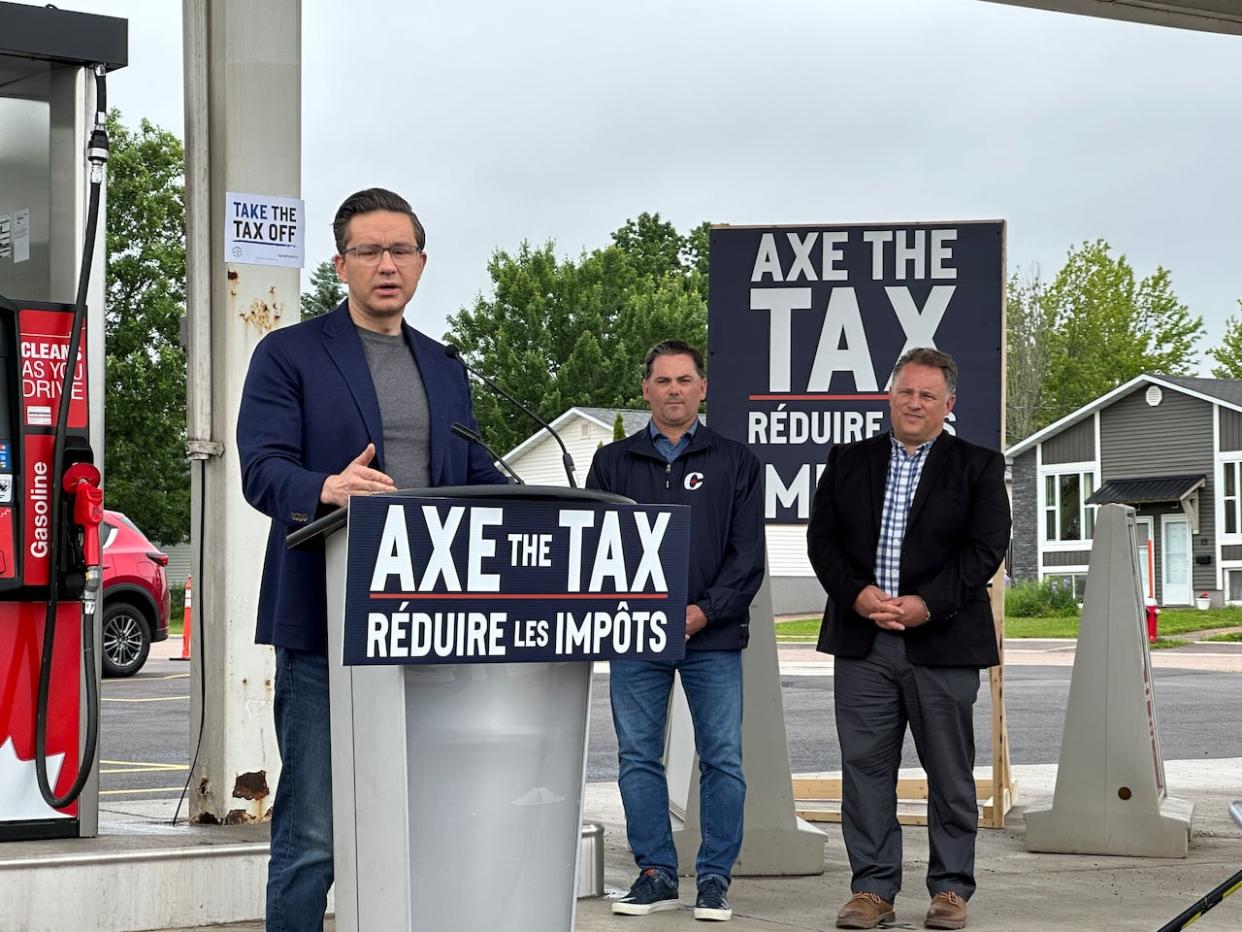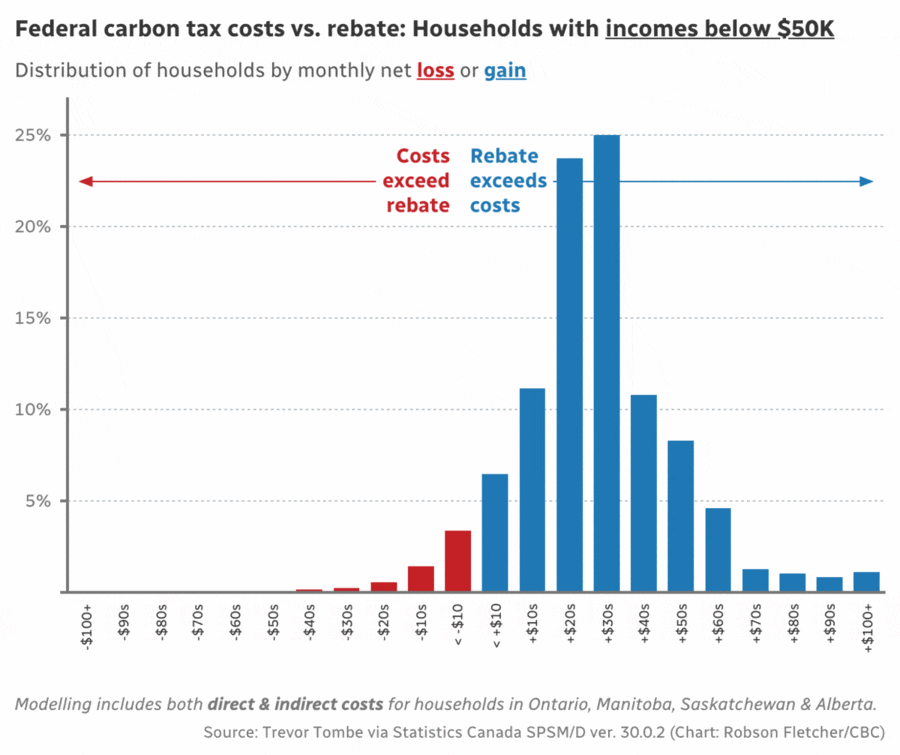If Canada axed its carbon tax — and rebates — this is how different households would gain or lose

"Axe the tax" (or its American counterpart, "ax the tax") has been used as a slogan in countless political campaigns over the decades.
It's a simple message, often a popular one and, hey, it rhymes.
Back in 1989, there were "Axe the Tax" rallies over the proposed GST. The events had a way of uniting political rivals who shared an opponent in prime minister Brian Mulroney. Speakers at a rally in Kindersley, Sask., included the Reform Party's Preston Manning, the Liberals' Lloyd Axworthy and the Saskatchewan NDP's Roy Romanow.
Today, the latest target of the perennial catchphrase is the federal carbon tax. Conservative Leader Pierre Pierre Poilievre has been hosting his own "Axe the Tax" rallies across the country for months now, similarly uniting opponents of Prime Minister Justin Trudeau.
The costs of the carbon tax typically take centre stage at these rallies. Less often mentioned are the associated rebates, which are worth roughly $70 to $140 per month for a family of four, depending on where they live. (Larger or smaller households receive proportionally more or less, respectively.)
This makes the carbon tax different from other forms of taxation. While there are modest GST rebates for low-income households, the carbon-tax rebates are universal and significantly larger.
Axing the carbon tax would, presumably, also axe the rebates. So, on balance, how would that shake out for Canadians?
Want to figure out your own carbon tax costs and rebate? Scroll down for an interactive calculator
The answer will vary — quite a lot — from household to household, depending on consumption habits. But numerous analyses over the years have shown that most households receive more in rebates than they pay in direct and indirect carbon-tax costs, combined. (This includes reports from the Parliamentary Budget Office that the Conservatives often cite in their opposition to the carbon tax, which may seem confusing, but we'll get to that in a moment.)
How much money, exactly, we are talking about here — and for whom?
Statistics Canada's Social Policy Simulation Database and Model offers some answers to those questions. That may sound extraordinarily nerdy but, rest assured, it's actually not as complicated as the name makes it out to be.
Here's how it breaks down.
A model based on actual Canadians
The SPSD/M (as it's known for short) is specialized software created and maintained by Statistics Canada that is used by economists, researchers, politicians and anyone interested in analyzing tax and transfer policies in the country.
The software is freely available and regarded as the pre-eminent tool for this type of analysis, said University of Calgary economist Trevor Tombe. While no model is perfect, this one is as good as it gets.
The tool combines a variety of information on income, taxes, spending and other economic measures collected from real Canadians and combined into a single database that's anonymized but representative of the population as a whole.

Trevor Tombe is an economics professor at the University of Calgary and a research fellow and the university's School of Public Policy. (Colin Hall/CBC)
Tombe extracted data from the latest version of the model and shared it with CBC News to illustrate how a hypothetical axing of the federal carbon tax would affect different households.
As it stands, there is some minor variation from province to province, but Tombe says the general trend is the same: "A clear majority of households do receive rebates that are larger than the carbon taxes they pay for."
One thing that sets households apart, however, is their income level.
"If we got rid of the carbon tax and the rebate," Tombe said, "then this would harm a much larger fraction of lower- and middle-income households than it would higher-income households."
Why income matters
The more fossil fuels you consume, the more carbon tax you pay directly. These costs are tacked on to the purchase price of gasoline, diesel, natural gas, propane, etc.
Then there are the indirect carbon-tax costs in other things you purchase. These come in the form of increased prices on the goods and services you buy, as companies pass along the costs of their own carbon taxes to consumers.
Rich folks tend to pay more on both fronts.
"Naturally, their incomes are higher and so they purchase more energy, more goods and services across the board," Tombe said. "And so they do have higher carbon tax costs, just as a function of higher levels of expenditure."
The rebates, however, aren't affected by income.
A family of four living in a 4,000-square-foot home with three cars in the garage and an RV in the driveway gets the same rebate as a family of four in the same city living in a 500-square-foot apartment and relying on public transit.
As a result, the rebates tend to have an outsized effect on lower-income folks. Firstly, they make up a larger share of their total income. And secondly, they tend to exceed their carbon tax costs more often.

An animated chart showing the net monthly impact of the federal carbon tax and rebates, depending on household income. (Robson Fletcher/CBC)
According to the Statistics Canada model, 94 per cent of households with incomes below $50,000 receive rebates that exceed their carbon-tax costs in 2023.
Roughly half of households in this income category see a net gain of between $20 and $40 per month. About four per cent see a net gain of $70 per month or more.
At the other end of the spectrum, only about 55 per cent of households with incomes above $250,000 receive more in rebates than they pay in costs, according to the data.
Roughly half of households in this income category see somewhere between a net loss of $20 per month and a net gain of $30 per month. About five per cent see a net loss of $100 per month or more.
These high-income households stand to gain the most if the tax were axed tomorrow.
Lower-income folks who are enjoying more in rebates than carbon-tax costs, meanwhile, stand to lose the most — both in absolute dollars and, especially, as a proportion of their total income.
Details, details ...
For these purposes, the model is only applicable to four provinces: Ontario, Manitoba, Saskatchewan and Alberta, which accounts for the vast majority of Canadians paying the federal carbon tax and receiving the rebates.
British Columbia and Quebec have their own carbon-pricing systems.
The Atlantic provinces are not yet included in the modelling in the same way because the federal carbon tax was only recently introduced in these jurisdictions. (An update to the model is expected next year.)
A separate analysis released by the Parliamentary Budget Officer (PBO) in March found households in Nova Scotia, Prince Edward Island and Newfoundland and Labrador, on average, will also receive more in rebates this year than they pay in direct and indirect carbon-tax costs combined. (New Brunswick was not included in the analysis because it had its own carbon-pricing system at the time.)
(It's also important to note the analysis was conducted before the Liberal government's decision to exempt home heating oil from the carbon tax, a move that disproportionately benefits people in Atlantic Canada.)
Given all that, you might think the PBO report would be welcome news to supporters of the carbon tax but (because nothing is simple when it comes to this stuff) it's actually cited more often by critics of the federal policy.
On the Conservative Party's "Axe The Tax" website, for example, it says the "Parliamentary Budget Officer report proves that the carbon tax will cost most households more than they ever get back."
These seemingly contradictory claims coming out of the same report have been a source of confusion.
But Tombe says they're not actually at odds; they're simply referring to two different things.
If not a carbon tax, then what?
In addition to looking at the "fiscal impact" on households (which weighs rebates against carbon-tax costs), the PBO also looked at "economic impacts."
This other section of its report estimates how the carbon tax affects the Canadian economy as a whole, including changes in employment and returns on capital, compared to a hypothetical scenario with no carbon tax and no other climate policy to replace it.
Under that scenario, the combined "fiscal and economic impacts" are a net negative for a majority of households by 2030, according to the PBO's analysis. (Although even then, lower-income households still enjoy a net gain.)
"It's best to think about both of these estimates as being true," Tombe said of the two sections in the PBO report.
He also said, however, that it's hard to imagine a real-life scenario with no form of national climate policy.
"If we were to think about eliminating the carbon tax today, we shouldn't be thinking about replacing it with nothing," Tombe said.
"We still have targets around lowering emissions, targets that all parties at least rhetorically support … and so if we're going to be achieving the same target but with tools other than carbon pricing, which is generally the most efficient way to incentivize emissions reductions by individuals and businesses, then we'll be replacing that system with something that has greater economic costs."
For now, at least, the federal carbon tax remains in effect.
And if you want to figure out how the rebates and costs balance out for your own household, you can plug your info into the interactive calculator below to find out.


